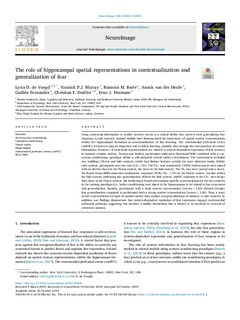The role of hippocampal spatial representations in contextualization and generalization of fear
Lycia, D. de Voogd; Doeller, Christian Fritz Andreas; P.J.Murray, Yannick; M. Barte, Ramona; van der Heide, Anouk; Fernandez, Guillen; J. Hermans, Erno
Journal article, Peer reviewed
Published version

Åpne
Permanent lenke
http://hdl.handle.net/11250/2637842Utgivelsesdato
2019Metadata
Vis full innførselSamlinger
Originalversjon
https://doi.org/10.1016/j.neuroimage.2019.116308Sammendrag
Using contextual information to predict aversive events is a critical ability that protects from generalizing fear responses to safe contexts. Animal models have demonstrated the importance of spatial context representations within the hippocampal formation in contextualization of fear learning. The ventromedial prefrontal cortex (vmPFC) is known to play an important role in safety learning, possibly also through the incorporation of context information. However, if contextual representations are related to context-dependent expression of fear memory in humans remains unclear. Twenty-one healthy participants underwent functional MRI combined with a cue-context conditioning paradigm within a self-navigated virtual reality environment. The environment included two buildings (Threat and Safe context), which had distinct features outside but were identical inside. Within each context, participants saw two cues (CS+, CS-). The CS+ was consistently (100% reinforcement rate) paired with an electric shock in the Threat context, but never in the Safe context. The CS- was never paired with a shock. We found robust differential skin conductance responses (SCRs; CS+ > CS-) in the Threat context, but also within the Safe context, indicating fear generalization. Within the Safe context, vmPFC responses to the CS+ were larger than those in the Threat context. We furthermore found environment-specific representations for the two contexts in the training paradigm (i.e., before conditioning took place) in the hippocampus to be related to fear expression and generalization. Namely, participants with a weak context representation (z-score < 1.65) showed stronger fear generalization compared to participants with a strong context representation (z-score > 1.65). Thus, a weak neural representation strength of spatial context may explain overgeneralization of memory to safe contexts. In addition, our findings demonstrate that context-dependent regulation of fear expression engages ventromedial prefrontal pathways suggesting this involves a similar mechanism that is known to be involved in retrieval of extinction memory.
